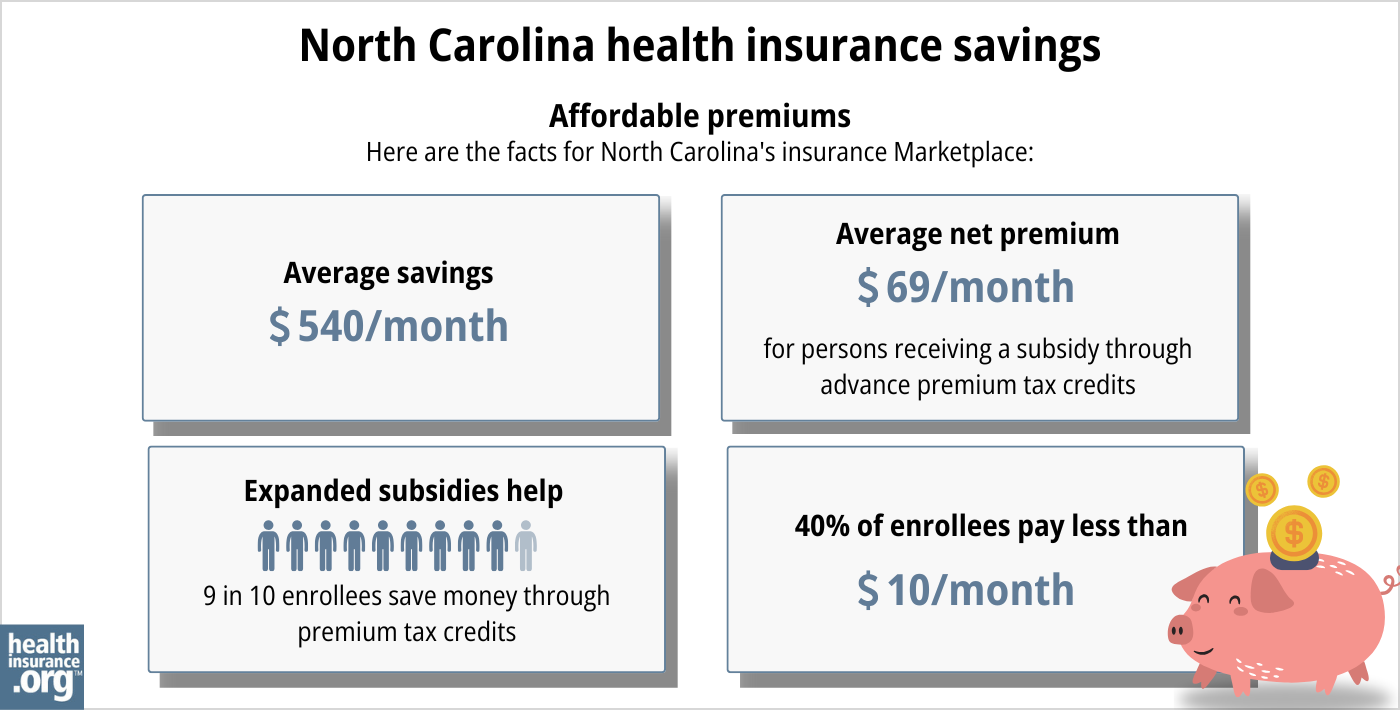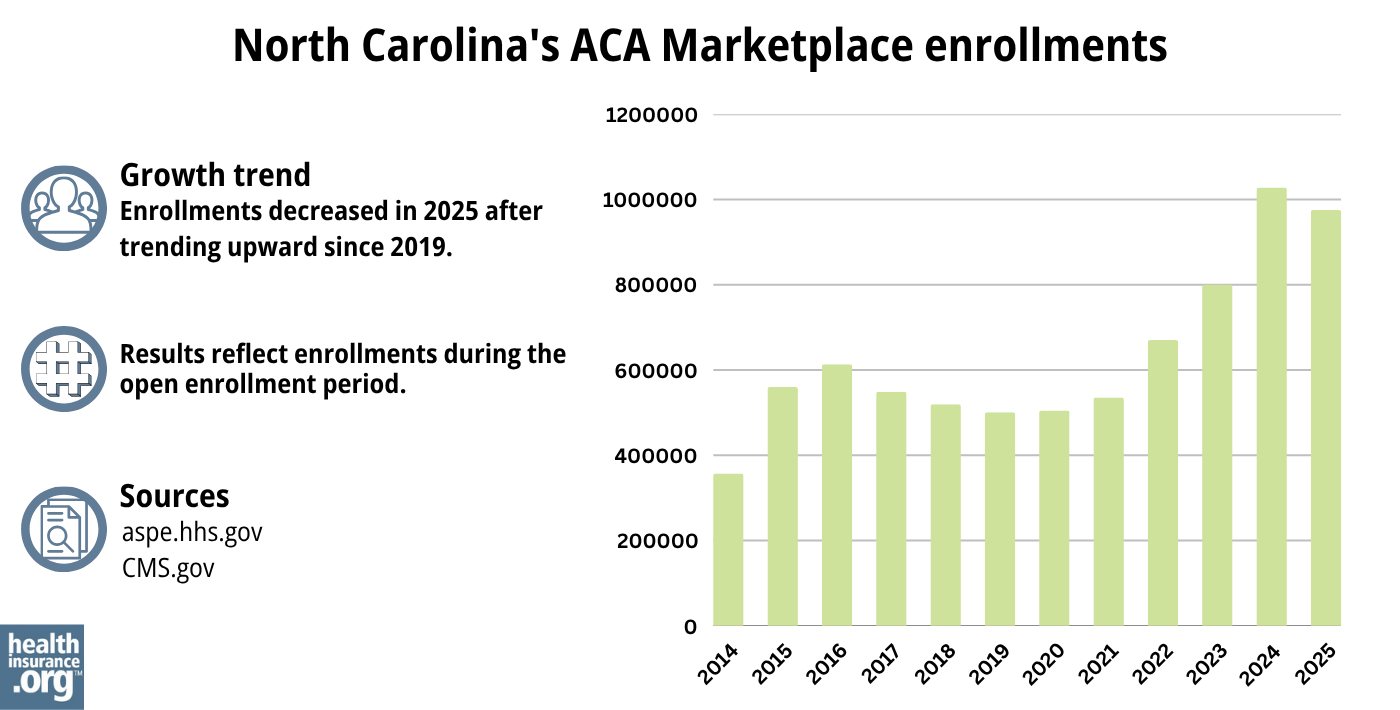Home > Health insurance Marketplace > North Carolina
North Carolina Marketplace health insurance in 2025

Compare ACA plans and check subsidy savings from a third-party insurance agency.

North Carolina health insurance Marketplace guide
This guide, including the FAQs below, was developed to help you understand the health insurance options and possible financial assistance available to you and your family in North Carolina.
The health plan options found in North Carolina’s ACA Marketplace/exchange are designed to cover people who don’t have access to Medicare, Medicaid, or an employer’s health plan. North Carolina uses the federally-facilitated health insurance exchange platform — Healthcare.gov — for residents to purchase its ACA Marketplace plans.
North Carolina’s Marketplace provides access to health insurance products from nine private insurers for 2025,3 all of which also offered coverage in 2024.
The federal government helps pay for insurance through an advance premium tax credit if you buy coverage from the exchange and are eligible for the tax credit based on your income. Some enrollees are also eligible for cost-sharing reductions, which reduce out-of-pocket costs on Silver-level plans for eligible enrollees.
North Carolina Medicaid expansion took effect on December 1, 2023, making hundreds of thousands of North Carolina residents newly eligible for Medicaid. Some were previously in the coverage gap, while others were previously eligible for subsidies to offset the cost of Marketplace coverage.4
Frequently asked questions about health insurance in North Carolina
Who can buy Marketplace health insurance?
To qualify for health coverage through the North Carolina Marketplace, you must:5
- Live in North Carolina
- Be lawfully present in the United States
- Not be incarcerated
- Not be enrolled in Medicare
Eligibility for financial assistance (premium subsidies and cost-sharing reductions) depends on your income and how it compares with the cost of the second-lowest-cost Silver plan in your area – which depends on your age and location. In addition, to qualify for financial assistance with your Marketplace plan you must:
- Not have access to affordable health coverage through your employer. If your employer offers coverage but you feel it’s too expensive, you can use our Employer Health Plan Affordability Calculator to see if you might qualify for premium subsidies in the Marketplace.
- Not be eligible for Medicaid or CHIP.
- Not be eligible for premium-free Medicare Part A.6
- If married, file a joint tax return.7
- Not be able to be claimed by someone else as a tax dependent.7
When can I enroll in an ACA-compliant plan in North Carolina?
In North Carolina, the open enrollment period for individual/family health coverage runs from November 1 to January 15.8
Your coverage will start on January 1 if you enroll before December 15. But if you apply between December 16 and January 16, your coverage will begin on February 1.9
Outside of open enrollment, a qualifying event is generally necessary to enroll or make changes to your coverage, although some people can qualify for a special enrollment period without a specific qualifying life event.
If you have questions about open enrollment, you can learn more in our comprehensive guide to open enrollment. We also have a comprehensive guide to special enrollment periods.
How do I enroll in a North Carolina Marketplace plan?
If you’re eligible for an ACA Marketplace plan, there are several ways you can enroll:
- Online through HealthCare.gov
- By phone at (800) 318-2596
- With local help in your community from an agent/broker, Navigator, or certified application counselors (these individuals are available to help you over the phone, online, and sometimes in-person, depending on your preference)
- Through an approved enhanced direct enrollment entity.10
How can I find affordable health insurance in North Carolina?
North Carolina uses the federally-facilitated exchange for individual market plans, so residents who buy their own health insurance enroll through HealthCare.gov.
As of early 2024, 96% of the people with effectuated Marketplace coverage in North Carolina were saving money on their premiums due to premium tax credits (subsidies) that averaged $558/month. After subsidies were applied, the average enrollee’s monthly cost was about $70/month (including those who paid full price).11
(The numbers above are based on effectuated enrollment. They differ from the numbers in the chart below as it includes some different metrics and is based on all enrollments completed during the open enrollment period for 2024 coverage.)
In addition to premium tax credits, the ACA also provides cost-sharing reductions (CSR) to enrollees with household income up to 250% of the federal poverty level, as long as they purchase a Silver-level plan.12 As of early 2024, half of North Carolina’s Marketplace enrollees were receiving CSR benefits.11
Between the premium subsidies and cost-sharing reductions, you may find that an ACA plan is the most affordable and robust health insurance option for you.

Source: CMS.gov 13
How many insurers offer Marketplace coverage in North Carolina?
Nine insurance companies offer individual/family health plans through North Carolina’s Marketplace for 2025 (all of which also offered coverage for 2024).3
Coverage areas vary by insurer, but most counties in North Carolina have at least four or five insurers offering coverage through the Marketplace for 2025.14
Are Marketplace health insurance premiums increasing in North Carolina?
The following average rate changes were approved for 2025 for the insurers that offer individual/family plans in North Carolina’s health insurance Marketplace (calculated before subsidies are applied).
North Carolina’s ACA Marketplace Plan 2025 APPROVED Rate Increases by Insurance Company |
|
|---|---|
| Issuer | Percent Increase |
| Aetna Health Inc. | 14.77% |
| Ambetter/Centene | 0.4% |
| AmeriHealth Caritas | 0.69% |
| Blue Cross and Blue Shield of NC | 2.98% |
| CareSource | 13.47% |
| Celtic/WellCare | 5% |
| Cigna | 4.12% |
| Oscar | 4.6% |
| UnitedHealthcare | 4.72% |
Source: North Carolina Department of Insurance3
Based on the enrollment numbers provided by the North Carolina Department of Insurance, the overall weighted average proposed rate increase was about 7%,15 and the approved rates are almost identical to the proposed rates.3 But there is quite a bit of variation from one plan to another.
And since most North Carolina Marketplace enrollees receive premium subsidies, the net premium change also depends on how a person’s subsidy amount changes from one year to the next (which depends on how the cost of the second-lowest-cost Silver plan changes).
For perspective, here’s a summary of how average unsubsidized premiums have changed each year in North Carolina’s individual/family market:
- 2015: Average increase of 12%16
- 2016: Average increase of 28.1%17
- 2017: Average increase of 24.3%18
- 2018: Average increase of 14.8%19
- 2019: Average decrease of 3.9%20
- 2020: Average decrease of 5.6%21
- 2021: Average preliminary increase of 4%22
- 2022: Average increase of 3.2%23
- 2023: Average increase of 7.93%24
- 2024: Average decrease of 1.3%25
How many people are insured through North Carolina’s Marketplace?
1,027,930 people enrolled in private plans through the North Carolina Marketplace during the open enrollment period for 2025 coverage.26
This was by far a record high (see chart below for enrollment in prior years), even though Medicaid expansion took effect in North Carolina in December 2023.
Before Medicaid expansion, people with income between 100% and 138% of the poverty level were eligible for Marketplace subsidies, whereas they’re now eligible for Medicaid instead. So states tend to see a dip in their Marketplace enrollment after expanding Medicaid. But North Carolina’s enrollment reached to a significant new record high for 2024.
The increase in enrollment (which has been ongoing in North Carolina since 2021) is driven in part by the American Rescue Plan (ARP). Under the ARP, ACA’s premium subsidies are larger and more widely available. The ARP’s subsidy enhancements have been extended through 2025 by the Inflation Reduction Act.27
The increase is also due to the “unwinding” of the pandemic-era Medicaid continuous coverage rule. Between June 2023 and April 2024, more than 272,000 people in North Carolina were disenrolled from Medicaid and transitioned to a Marketplace plan.28

Source: 2014,29 2015,30 2016,31 2017,32 2018,33 2019,34 2020,35 2021,36 2022,37 202338 2023,39 2024,40 202541
What health insurance resources are available to North Carolina residents?
HealthCare.gov
800-318-2596
State Exchange Profile: North Carolina
The Henry J. Kaiser Family Foundation overview of North Carolina’s progress toward creating a state health insurance exchange.
North Carolina Institute of Medicine (NCIOM)
Health Insurance Smart NC
Assists people insured by private health plans, Medicaid, or other plans in resolving problems pertaining to their health coverage; assists uninsured residents with access to care.
Toll free: 1-877-885-0231
Managed Care Patient Assistance Program
Serves consumers who are members of managed health benefit plans.
(919) 733-6272 / Toll-Free: 1-866-867-6272 (in North Carolina only)
[email protected]
Community Care of North Carolina
Legal Aid of North Carolina (855-733-3711)
Louise Norris is an individual health insurance broker who has been writing about health insurance and health reform since 2006. She has written dozens of opinions and educational pieces about the Affordable Care Act for healthinsurance.org.

Looking for more information about other options in your state?
Need help navigating health insurance options in North Carolina?
Explore more resources for options in North Carolina including short-term health insurance, dental insurance, Medicaid and Medicare.
Speak to a sales agent at a licensed insurance agency.
Footnotes
- ”2025 OEP State-Level Public Use File (ZIP)” Centers for Medicare & Medicaid Services, Accessed May 13, 2025 ⤶ ⤶
- ”Rate Review Submissions” RateReview.HealthCare.gov. Accessed Jan. 7, 2025 ⤶
- ”Health Insurance Rate Change Requests for 2025 for Individual Policies (APPROVED)” North Carolina Department of Insurance – Life & Health Division. Oct. 28, 2024 ⤶ ⤶ ⤶ ⤶
- Questions and Answers about Medicaid Expansion. North Carolina Medicaid Division of Health Benefits. Accessed November 2023. ⤶
- ”A quick guide to the Health Insurance Marketplace” HealthCare.gov ⤶
- Medicare and the Marketplace, Master FAQ. Centers for Medicare and Medicaid Services. Accessed November 2023. ⤶
- Premium Tax Credit — The Basics. Internal Revenue Service. Accessed May 10, 2024 ⤶ ⤶
- “When can you get health insurance?” HealthCare.gov, 2023 ⤶
- “When can you get health insurance?” HealthCare.gov, 2023 ⤶
- “Entities Approved to Use Enhanced Direct Enrollment” CMS.gov, Aug. 9, 2024 ⤶
- ”Effectuated Enrollment: Early 2024 Snapshot and Full Year 2023 Average” CMS.gov, July 2, 2024 ⤶ ⤶
- ”APTC and CSR Basics” Centers for Medicare & Medicaid Services. June 2024. ⤶
- “2025 Marketplace Open Enrollment Period Public Use Files” CMS.gov, May 2025 ⤶
- ”Plan Year 2025 Qualified Health Plan Choice and Premiums in HealthCare.gov Marketplaces” Centers for Medicare & Medicaid Services. Oct. 25, 2024 ⤶
- ”2025 Plan Year ACA Rate Filings” North Carolina Department of Insurance. Accessed Aug. 15, 2024. ⤶
- Analysis Finds No Nationwide Increase in Health Insurance Marketplace Premiums. The Commonwealth Fund. December 2014. ⤶
- FINAL PROJECTION: 2016 Weighted Avg. Rate Increases: 12-13% Nationally* ACA Signups. October 2015. ⤶
- Avg. UNSUBSIDIZED Indy Mkt Rate Hikes: 25% (49 States + DC). ACA Signups. August 2016. ⤶
- 2018 Rate Hikes. ACA Signups. October 2017 ⤶
- 2019 Rate Hikes. ACA Signups. October 2018. ⤶
- 2020 Rate Changes. ACA Signups. October 2019. ⤶
- 2021 Rate Changes. ACA Signups. October 2020. ⤶
- 2022 Rate Changes. ACA Signups. October 2021. ⤶
- UPDATED: FINAL Unsubsidized 2023 Premiums: +6.2% Across All 50 States +DC. ACA Signups. Accessed November 2023. ⤶
- North Carolina: *Final* Avg. Unsubsidized 2024 #ACA Rate Changes: -1.3% (Updated). ACASignups.net, October 2023 ⤶
- ”Health Insurance Marketplaces 2024 Open Enrollment Period Report” CMS.gov. March 22, 2024 ⤶
- “Health Insurance Marketplaces 2023 Open Enrollment Report” CMS.gov, Accessed August 2023 ⤶
- HealthCare.gov Marketplace Medicaid Unwinding Report. Medicaid.gov. Data through April 2024; Accessed Aug. 15, 2024 ⤶
- “ASPE Issue Brief (2014)” ASPE, 2015 ⤶
- “Health Insurance Marketplaces 2015 Open Enrollment Period: March Enrollment Report”, HHS.gov, 2015 ⤶
- “HEALTH INSURANCE MARKETPLACES 2016 OPEN ENROLLMENT PERIOD: FINAL ENROLLMENT REPORT” HHS.gov, 2016 ⤶
- “2017 Marketplace Open Enrollment Period Public Use Files” CMS.gov, 2017 ⤶
- “2018 Marketplace Open Enrollment Period Public Use Files” CMS.gov, 2018 ⤶
- “2019 Marketplace Open Enrollment Period Public Use Files” CMS.gov, 2019 ⤶
- “2020 Marketplace Open Enrollment Period Public Use Files” CMS.gov, 2020 ⤶
- “2021 Marketplace Open Enrollment Period Public Use Files” CMS.gov, 2021 ⤶
- “2022 Marketplace Open Enrollment Period Public Use Files” CMS.gov, 2022 ⤶
- “Health Insurance Marketplaces 2023 Open Enrollment Report” CMS.gov, 2023 ⤶
- “Health Insurance Marketplaces 2023 Open Enrollment Report” CMS.gov, 2023 ⤶
- ”HEALTH INSURANCE MARKETPLACES 2024 OPEN ENROLLMENT REPORT” CMS.gov, 2024 ⤶
- “2025 Marketplace Open Enrollment Period Public Use Files” CMS.gov, May 2025 ⤶

